| Listing 1 - 9 of 9 |
Sort by
|
Book
ISBN: 9789042923478 9042923474 Year: 2010 Volume: 45 Publisher: Leuven [Belgium] ; Walpole, MA : Peeters,
Abstract | Keywords | Export | Availability | Bookmark
 Loading...
Loading...Choose an application
- Reference Manager
- EndNote
- RefWorks (Direct export to RefWorks)
Negative theology --- Théologie négative --- Christianity --- History of doctrines --- Christianisme --- Histoire des doctrines --- Jesus Christ --- History of doctrines. --- Christianity. --- Théologie négative --- Negative theology - Christianity. --- Jesus Christ - History of doctrines.
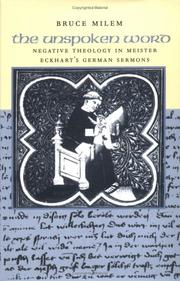
ISBN: 0813210194 9780813210193 Year: 2002 Publisher: Washington (D.C.): Catholic university of America press
Abstract | Keywords | Export | Availability | Bookmark
 Loading...
Loading...Choose an application
- Reference Manager
- EndNote
- RefWorks (Direct export to RefWorks)
Preaching --- Negative theology --- Sermons, German --- Sermons, Medieval --- History --- Christianity --- Sermons --- History and criticism. --- History and criticism --- Eckhart, --- -Sermons, German --- -Sermons, Medieval --- -Negative theology --- -Apophatic theology --- Via negativa (Theology) --- Theology --- Mysticism --- German sermons --- Christian preaching --- Homiletics --- Speaking --- Pastoral theology --- Public speaking --- -History and criticism --- -Sermons --- Religious aspects --- Eckhart Meister --- -History --- Christianity&delete& --- Sermons&delete& --- Eckart, --- Eckehart, --- Eckhart, Johannes, --- Ekharti, --- Ėkkhart, --- Medieval sermons --- Preaching - Germany - History - Middle Ages, 600-1500. --- Negative theology - Christianity - Sermons - History and criticism. --- Sermons, German - History and criticism. --- Sermons, Medieval - Germany - History and criticism. --- Negative theology - Christianity - Sermons - History and criticism --- Sermons, German - History and criticism --- Sermons, Medieval - Germany - History and criticism --- Eckhart, - Meister, - -1327
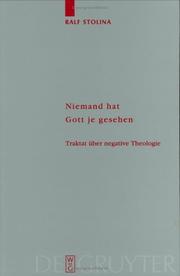
ISBN: 3110168537 130639869X 3110814188 311177435X 9783110168532 Year: 2000 Volume: 108 Publisher: Berlin de Gruyter
Abstract | Keywords | Export | Availability | Bookmark
 Loading...
Loading...Choose an application
- Reference Manager
- EndNote
- RefWorks (Direct export to RefWorks)
Mit diesem Band wird eine theologische Erkenntnislehre vorgestellt. Die Studie entwickelt im Gespräch mit maßgeblichen Konzeptionen der Theologiegeschichte einen theologischen Begriff negativer Theologie. Für diesen ist die grundsätzliche Verbundenheit von Reflexion und Lehre, Glaubensvollzug sowie Glaubenserfahrung konstitutiv: Negative Theologie ist Rede von Gott auf der Grundlage seiner Offenbarung und unter dem Gesichtspunkt der Verborgenheit Gottes in seiner Offenbarung. This volume introduces a theological epistemology. In conversation with major conceptions of the history of theology, this study develops a theological concept of negative theology. For the latter the basic connection of reflection and teaching, faith as a practiced as well as the experience of faith, are constituent: negative theology is speech about God on the basis of his revelation and from the viewpoint of the hiddenness of God in his revelation.
Negative theology --- Christianity --- 230*705 --- -Apophatic theology --- Via negativa (Theology) --- Theology --- Mysticism --- Post-moderne theologie. Postmoderne theologie --- -Post-moderne theologie. Postmoderne theologie --- 230*705 Post-moderne theologie. Postmoderne theologie --- -230*705 Post-moderne theologie. Postmoderne theologie --- Apophatic theology --- Via negativa (Christian theology) --- Christianity. --- Negative theology - Christianity
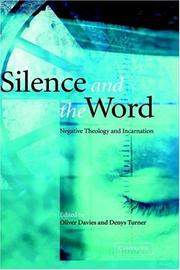
ISBN: 0521817188 0521067391 1107126010 0511176864 0511042698 0511157762 0511325614 0511487657 1280434333 0511054440 9780521817189 9780511042690 9780511054440 9780511487651 9780521067393 9781107126015 9781280434334 9780511176869 9780511157769 9780511325618 Year: 2002 Publisher: Cambridge Cambridge University Press
Abstract | Keywords | Export | Availability | Bookmark
 Loading...
Loading...Choose an application
- Reference Manager
- EndNote
- RefWorks (Direct export to RefWorks)
Negative theology or apophasis - the idea that God is best identified in terms of 'absence', 'otherness', 'difference' - has been influential in modern Christian thought, resonating as it does with secular notions of negation developed in continental philosophy. Apophasis also has a strong intellectual history dating back to the early Church Fathers. Silence and the Word both studies the history of apophasis and examines its relationship with contemporary secular philosophy. Leading Christian thinkers explore in their own way the extent to which the concept of the apophatic illumines some of the deepest doctrinal structures of Christian faith, and of Christian self-understanding both in terms of its historical and contemporary situatedness, showing how a dimension of negativity has characterised not only traditional mysticism but most forms of Christian thought over the years.
Negative theology --- Christianity --- Natural theology --- Christian theology --- 232.8 --- -232.8 Jezus Christus als mens. Menswording. Incarnatie --- Jezus Christus als mens. Menswording. Incarnatie --- Apophatic theology --- Via negativa (Theology) --- 232.8 Jezus Christus als mens. Menswording. Incarnatie --- Arts and Humanities --- Religion --- Negative theology - Christianity - Congresses
Book
ISBN: 9783451022265 3451022265 Year: 2007 Volume: 226 Publisher: Freiburg Herder
Abstract | Keywords | Export | Availability | Bookmark
 Loading...
Loading...Choose an application
- Reference Manager
- EndNote
- RefWorks (Direct export to RefWorks)
230*7 --- 230*7 Recente, hedendaagse theologische discussies --- Recente, hedendaagse theologische discussies --- God (Christianity) --- God --- Negative theology --- Via negativa (Christian theology) --- Metaphysics --- Misotheism --- Monotheism --- Religion --- Theism --- Christianity --- Trinity --- Knowableness&delete& --- History of doctrines --- Knowableness --- Negative theology - Christianity --- God - Knowableness - History of doctrines --- God (Christianity) - Knowableness - History of doctrines
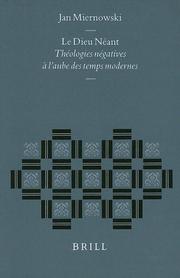
ISBN: 9004109153 9004474919 9789004109155 9789004474918 Year: 1998 Volume: 82 Publisher: Leiden Brill
Abstract | Keywords | Export | Availability | Bookmark
 Loading...
Loading...Choose an application
- Reference Manager
- EndNote
- RefWorks (Direct export to RefWorks)
Le Dieu Néant. Théologies Négatives à l'Aube des Temps Modernes is a study of the diverse intellectual possibilities presented to Medieval and Renaissance intellectuals by the negative theology of pseudo-Dionysius the Areopagite. It deals specifically with the ontological, epistemological and semiotic aspects of interpretations of Dionysian philosophy developed by such thinkers as Thomas Aquinas, Ficino, Cusanus and Bovelles. It also attempts to differentiate between the negative theology specific to Dionysius, and those elements of negative thinking peculiar to Hermetism and the Christian Cabala. This analysis of negative theology sheds new light on the differences between major intellectual currents of European philosophy (scholasticism, Italian Neoplatonism, German and French mysticism, occultism), while introducing useful distinctions into the history of the Dionysian tradition itself.
Negative theology --- God --- Christianity --- History of doctrines --- Pseudo-Dionysius --- -Negative theology --- -141.4 --- Apophatic theology --- Via negativa (Theology) --- Theology --- Mysticism --- Metaphysics --- Misotheism --- Monotheism --- Religion --- Theism --- -History of doctrines --- Stelsels met betrekking tot het standpunt van het godsprobleem --- Pseudo-Dionysius the Areopagite --- 141.4 Stelsels met betrekking tot het standpunt van het godsprobleem --- God (Christianity) --- 141.4 --- Christianity&delete& --- Pseudo-Dionysius, --- Via negativa (Christian theology) --- Negative theology - Christianity - History of doctrines --- God - History of doctrines
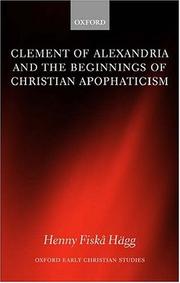
ISBN: 9780199288083 0199288089 019160416X 1281154598 9786611154592 1435624165 0191537101 Year: 2006 Publisher: Oxford : Oxford University Press,
Abstract | Keywords | Export | Availability | Bookmark
 Loading...
Loading...Choose an application
- Reference Manager
- EndNote
- RefWorks (Direct export to RefWorks)
Can humans know God? Can created beings approach the Uncreated? The concept of God and questions about our ability to know him are central to this book. Eastern Orthodox theology distinguishes between knowing God as he is (his divine essence) and as he presents himself (through his energies), and thus it both negates and affirms the basic question: man cannot know God in his essence, but may know him through his energies. Henny Fiska Hagg investigates this earliest stage of Christian negative (apophatic) theology, as well as the beginnings of the distinction between essence and energies, focusing on Clement of Alexandria in the late second century. Clement's theological, social, religious, and philosophical milieu is also considered, as is his indebtedness to Middle Platonism and its concept of God.
Negative theology --- Théologie négative --- Christianity --- History of doctrines. --- Christianisme --- Histoire des doctrines --- Clement, --- Theologie negative --- -276 =75 CLEMENS ALEXANDRINUS --- 231.133.11 --- Apophatic theology --- Via negativa (Theology) --- Theology --- Mysticism --- -History of doctrines. --- Griekse patrologie--CLEMENS ALEXANDRINUS --- Kenbaarheid van God --- Clemens, --- Clemens, Titus Flavius, --- Clément, --- Clemente, --- Klemens, --- Klēmens, --- Kliment, --- Titus Flavius Clemens, --- إكليمنضس السكندري --- 231.133.11 Kenbaarheid van God --- Théologie négative --- Christianity. --- 276 =75 CLEMENS ALEXANDRINUS --- Christianity&delete& --- History of doctrines --- Klēmēs, --- Negative theology - Christianity - History of doctrines. --- Theologie negative - Christianisme - Histoire des doctrines --- Clement, - of Alexandria, Saint, - ca. 150-ca. 215.
Book
ISBN: 9789042924734 904292473X Year: 2011 Volume: 4 Publisher: Leuven Peeters
Abstract | Keywords | Export | Availability | Bookmark
 Loading...
Loading...Choose an application
- Reference Manager
- EndNote
- RefWorks (Direct export to RefWorks)
Augustine's way of speaking about God has been frequently deplored. It has been dismissed as too confident regarding the content of its assertions and too narrowly confined. The reception of Augustine's work appears to indicate that there was not a little truth to this view. Augustine's affirmative statements on God's essence and activities constituted the 'initial capital' of Christian theology and spirituality. In contemporary religion, a tendency is in evidence to deny that too specific an image of God can really contain absolute truth. Fully formulated religious truths have to be placed in perspective, or must even be deconstructed, especially if the suspicion arises that they inhibit openness to authentic religious experiences of unity and harmony. Given such an outlook on religion, it seems understandable that those who take contemporary culture's renewed interest in religion seriously ignored Augustine's work as an authoritative source for 'post-Christian' discourse about God.
Augustine of Hippo --- Negative theology --- God (Christianity) --- Christianity --- Knowableness --- Augustine, --- 276 =71 AUGUSTINUS --- Latijnse patrologie--AUGUSTINUS --- Via negativa (Christian theology) --- Knowableness of God --- Knowledge of God (Knowableness of God) --- Knowledge (Knowableness) --- Avgustin, Blazhennyĭ, --- Augustinus, Aurelius, --- Augustyn, --- Augustin, --- Ughasṭīnūs, --- Agostino, --- Agustí, --- Augoustinos, --- Aurelius Augustinus, --- Augustinus, --- Agustín, --- Aurelio Agostino, --- Episkopos Ippōnos Augoustinos, --- Augoustinos Ipponos, --- Agostinho, --- Aurelli Augustini, --- Augustini, Aurelli, --- Aurelii Augustini, --- Augustini, Aurelii, --- Ōgostinos, --- Agostino, Aurelio, --- אוגוסטינוס הקדוש --- أغسطينوس، --- 奥古斯丁 --- Augustine --- God --- Attributes --- Avgustin, --- Augustinus, Aurelius --- Agostinho --- Augustine d'Hippone --- Agostino d'Ippona --- Augustin d'Hippone --- Augustinus Hipponensis, sanctus --- Sant'Agostino --- Augustinus van Hippo --- Aurelius Augustinus --- Aurelio Agostino --- 聖アウグスティヌス --- アウグスティヌス --- Negative theology - Christianity --- God (Christianity) - Knowableness --- Augustine, - Saint, Bishop of Hippo
Book
ISBN: 9782845739758 2845739753 Year: 2011 Publisher: Paris Parole et silence
Abstract | Keywords | Export | Availability | Bookmark
 Loading...
Loading...Choose an application
- Reference Manager
- EndNote
- RefWorks (Direct export to RefWorks)
Trinity --- God (Christianity) --- Creation --- Negative theology --- History of doctrines --- Christianity --- Thomas, --- 231.01 --- 231.51 --- 2 THOMAS AQUINAS:231 --- God --- Biblical cosmogony --- Cosmogony --- Natural theology --- Teleology --- Beginning --- Biblical cosmology --- Creation windows --- Creationism --- Evolution --- 231.51 De Deo creatore. Schepping --- De Deo creatore. Schepping --- 231.01 Drieëenheid. Drievuldigheid --- Drieëenheid. Drievuldigheid --- 2 THOMAS AQUINAS:231 Godsdienst. Theologie-:-God. De Deo uno et trino:--dogmatisch--THOMAS AQUINAS --- Godsdienst. Theologie-:-God. De Deo uno et trino:--dogmatisch--THOMAS AQUINAS --- Christianity&delete& --- Akʻvineli, Tʻoma, --- Akvinietis, Tomas, --- Akvinskiĭ, Foma, --- Aquinas, --- Aquinas, Thomas, --- Foma, --- Thomas Aquinas, --- Tʻoma, --- Toma, --- Tomas, --- Tomasu, --- Tomasu, Akwinasu, --- Tomasz, --- Tommaso, --- Tʻovma, --- Тома, Аквінський, --- תומאס, --- תומס, --- اكويني ، توما --- Ākvīnās, Tūmās, --- اكويني، توما, --- آکويناس، توماس, --- Trinity - History of doctrines - Middle ages, 600-1500 --- God (Christianity) - History of doctrines - Middle Ages, 600-1500 --- Creation - History of doctrines - Middle Ages, 600-1500 --- Negative theology - Christianity - History of doctrines --- Thomas, - Aquinas, Saint, - 1225?-1274 --- Thomas, - Aquinas, Saint, - 1225?-1274 - Summa contra gentiles
| Listing 1 - 9 of 9 |
Sort by
|

 Search
Search Feedback
Feedback About UniCat
About UniCat  Help
Help News
News